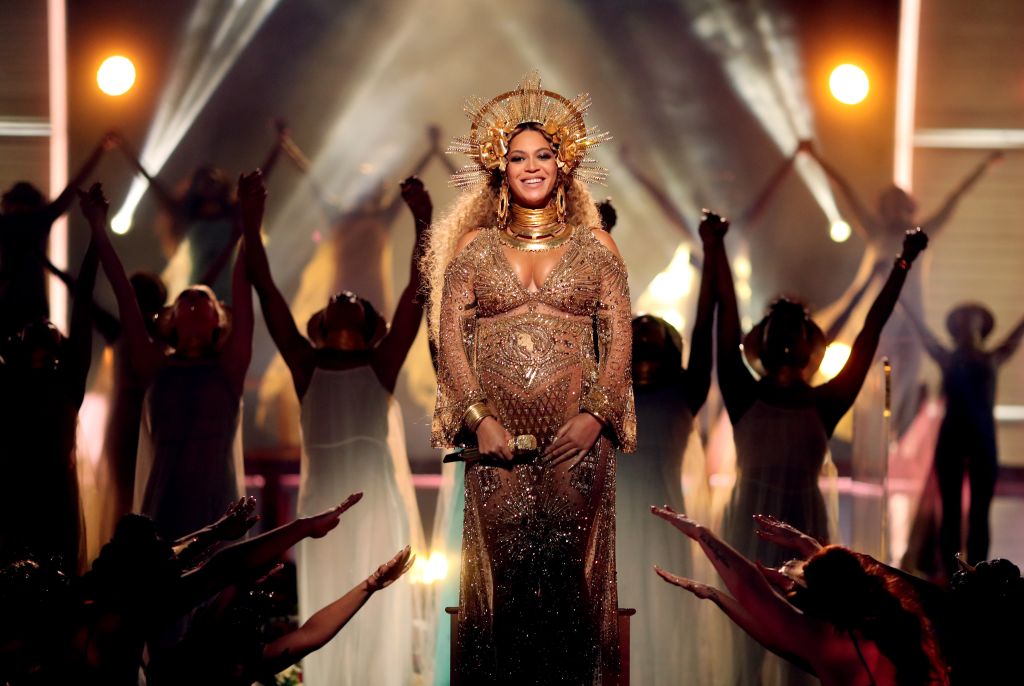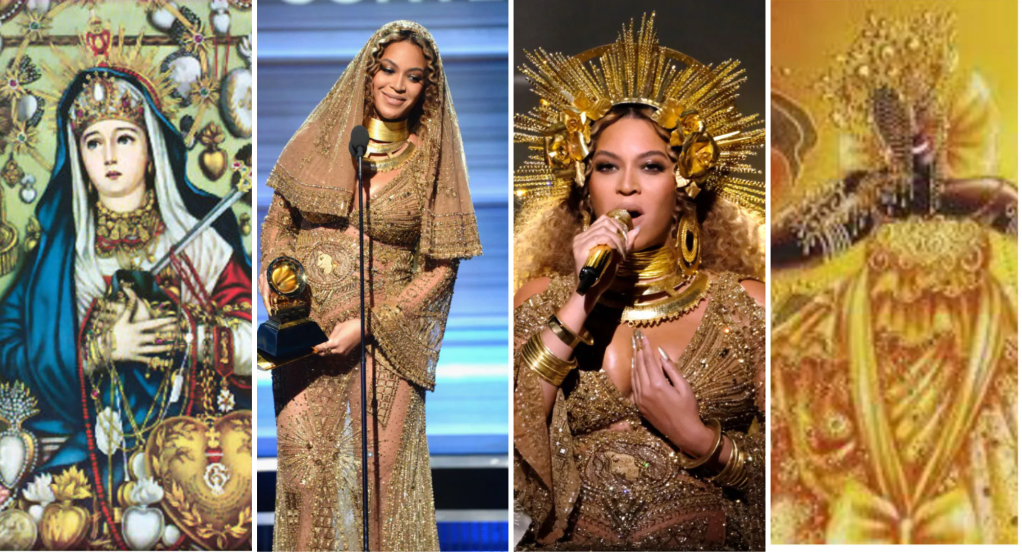Beyonce, Cardi B, Fat Joe & Starboy Source Inspiration From African Religions
Black History Month, it’s important that we not only focus on the triumphs, history, and journeys of Black Americans but where the source of Black beauty came from. While Black History Month is a time celebrated in America, it’s important to always remember that our history is deeper than America.
1. Beyonce 2017 Grammy Gown & Oshun/Erusile Freeda
In 2017, Beyoncé’s Grammy performance gold, sheer sequin, and studded gown, with a gold halo-like headdress, left many people wondering where her wardrobe was inspired from. Her attire was inspired by a Holy Force/Orisha/Loa of African religions known as Oshun in Yoruba and Santeria faiths and Erusile Freeda in the Voodoo faith. In many African traditions, they recognize the same force, just under multiple names due to the differences in lands and dialect barriers.

Source: Christopher Polk / Getty
From the indigenous lands of Haiti, Dominican Republic, Cuba, Brazil and Nigeria, traditions and faiths have spread across the world from the African Diaspora. From Haiti, originated the Voodoo faith, meaning high and sacred of God, in which they praise one God, Jesus Christ and the Loas. In the Yourba faith, fueled out of Nigeria and the Santeria/ Lucumí faith out of the Dominican Republic and other Latin American Countries , they too believe in one God, Jesus Christ and the Orisha. The Loas, Erusile Freeda, or Orishas Oshun and Oxúm, is who Beyoncé imitated in her highly praised performance.
Known by many names, this Spiritual Force is universally known as the one that governs pure love, care, compassion, act of kindness, the ability to give with an open hand and all matters of the heart. Love is the most powerful weapon that God gave the world. He entrusted Erusile Freeda to be the keeper of love. As depicted in pictures and paintings, the Orisha, Oshun/ Loa, Erusile Freeda is dressed in gold from riches of the earth, beautiful and a bountiful amounts of jewels, pearls, diamonds, and draped across her head is a golden sparkled vail with a decadent halo-like crown encapsulated with astounding diamonds and jewels, structured as a star. Erusile Freeda/ Oshun also governs the territory of the river and waterfalls.

Source: Beyonce- Erusile Freeda- Oshun / Beyonce- Erusile Freeda- Oshun
While this beautiful force of pure love not only has a heart of gold, they are dressed in it. Erusile Freeda or Oshun is commonly and unfortunately represented in a lustful and sexual manner. Many confuse love with sex and it completely distorts the innocence and portrayal of this Godly force. While Beyoncé replicated her perception and beauty of this Holy Force, others argued that Beyonce’s seductive outfit contradicted what Erusile Freeda/Oshun actually stands for.
Nonetheless, Beyonce’s 2017 Grammy performance gown and headdress did what it was supposed to do. It surfaced as a major topic of discussion and contention and it gave a platform, igniting interest for people to want to learn more about African spirituality, the roots of true black history and the origins of our culture.
2. Fat Joe, Cardi B Song “Yes” & Hector Lavoe & Santeria
Now let’s deep dive into Fat Joe, Cardi B, Anuel AA – YES. Fat Joe used two aspects of the Santeria/ Lucemi religion in this song. One is a video clip of a religious ceremony at the ocean and then the other is a sampled beat from Hector Lavoe’s song, “Aguanile”.
If you ever watched the music video for the song, “Yes”, there’s a part in the beginning where women are wearing all white dresses and headscarves, standing at the beach. This clip shows a religious ceremony at the ocean practiced by those of different African faiths, giving honor to the Spiritual Force that governs the Ocean.
The powerful force of family, stability, and the natural territory, the ocean, is known as the Loa, Erusile Dantour or the Orisha, Yemaya. Honored all over the world as the “Mother of All”, this force reigns as Queen – exemplifying honor, respect, and spiritual devotion. The images depicting this force embrace a mothering nature, welcoming all who are in need of hope, shelter, and security.
During these ceremonies and rituals at the ocean or different bodies of water, the practitioners of these faiths use the water for spiritual baths and cleansing.
Spiritual baths have traditionally connected us with natural healing territories that predate human existence. Healing waters from the ocean, river, and the rains from above have the innate power to cleanse, rejuvenate and set a new direction with new beginnings.
Here is a video of a high priestess of the Voodoo religion, Gro Mambo Angela Novanyon Idizol, conducting a spiritual bath at the Ocean. The practitioners greet the ocean as a means of paying homage and respect to the Spiritual Force, Erusile Dantour. This can be seen in both the video with Gro Mambo and in the clip of Fat Joe and Cardi B’s song. During these spiritual baths, different medicines and healing herbs are mixed alongside the healing water of the ocean.
Fat Joe also sampled the soundtrack for “Yes” using Hector Lavoe’s song, “Aguanile”, from his eighth album, El Juicio. Lavoe was a beloved musician who helped popularize salsa with albums like Cosa Nuestra, De Ti Depende and Comedia.
Digging a little deeper, Aguanile is a Yoruba word (A language from Nigeria West Africa)
Salsa it stems from the Afro-Cuban religion, Santería. You hear it (and other santería phrases) a lot in Cuban salsa. Most often you hear the full phrase “Aguanile mai mai” and it is part of the dialect for the Spiritual Force/Orisha/Loa, all known by the name of Ogun. Ogun also known as Papa Ogun is the force that governs truth, strength, war, money, finances. He is also the governor of all metals. In his area of governing the truth, war and strength, while many people will pray to him when they are in a fight, whether it be one in court, on a battlefield or personal struggle.
While some people were intrigued by Fat Joe’s music video visual, others expressed that they thought it was offensive to include those religious components while the rest of the video displayed women twerking under neon fluorescent lights.
In response to the complaints, Fat Joe said, Joe explained how it was an essential blessing to the intro and Lavoe, who also practiced Santería.
“We tried to pay respect at the intro of the video. Everyone who took part in this video knew the concept,” he said. “We have nothing but respect. Hip hop has always taken samples and flipped it into something new. I tried to pay homage. Sorry, you took offense, I understand.”
We tried to pay respect at the intro of the video everyone who took part of this video knew the concept, we have nothing but respect Hip hop has always taken samples and flipped it into something new i tried to pay homage sorry you took offense i understand https://t.co/R6E2dgljmA
— FAT JOE (@fatjoe) October 9, 2019
One thing people don’t always look at, is that while some may not agree with the combination of both religious components in Hip Hop videos, they fail to realize that it gives a breakthrough connecting two audiences together and broadening the exposure of African faiths. As the world takes on more interest in Caribbean and Afrobeat music as their mainstream music, more questions arise about the faiths and cultures of where this music originated.
3. Starboy Ft. WizKid Song, “Soco” & Olodumare
Nigerian artist, Starboy’s song, “Soco Feat. WizKid, Terri, Ceeza Milli & Spotless, is another example where African religious components are used in mainstream music. In this song, Starboy gives praise and homage to Olodumare, spelled Eledumare which is also recognized – as meaning God in Yoruba. The lyric in his song reads:
“Eledumare bless you with body oh baby oh / StarBoy go bless you with money oh omoge oh / Eledumare bless you with body oh baby /StarBoy go bless you with money oh omoge oh”
As interpreted by genius.com, “Olodumare is the name given to one of the three manifestations of the Supreme God in the Yoruba pantheon. Olodumare is the Supreme Creator. He carries the responsibility of coordinating the Universe, while Olofi is identified with Olofin Oduduwa, who brings existence to earth.”
Needless to say, influence is powerful. African Americans for centuries have been the center of influence for style, dance, music, sports, etc…However, the roots of this influence run deep, deriving from a land of culture, faith, spirituality and power. African Tradition and its forces will always live through our veins, whether we recognize them or not. It is a part of who we are and who we will forever be.


